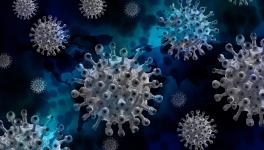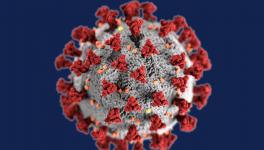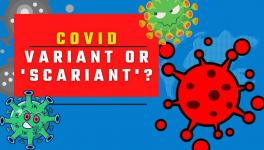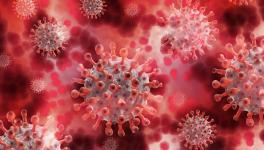Viewing Covid-19 Pandemic Naturally, Not Conspiratorially
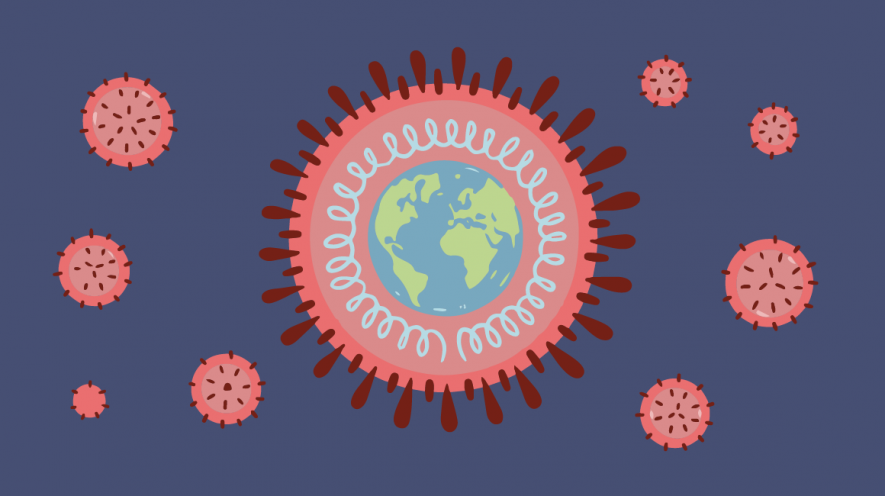
The COVID-19 pandemic caused by the coronavirus SARS-CoV-2 is one of the most devastating pandemics. It has exposed the dark underbelly of health systems in many developed countries where privatised systems dominate. It has caused a massive loss of lives and livelihoods in the US, India, Brazil and other countries. Countries with strong public health systems such as China and Cuba have withstood the onslaught much better. It is the power of science and technology—especially the open and quick sharing of data—that has led to the development of COVID-19 diagnostics: the RT-PCR test and vaccines. If Chinese scientists had not quickly shared the virus genome, it would have been impossible to kick-start diagnostics and vaccines.
Social media, one of the consequences of current technologies, also has a darker side: it has thrown up an infodemic or epidemic of misinformation. Take for instance the manufactured controversies about whether the SARS-CoV-2 virus evolved naturally or was artificially created or modified by Chinese scientists, who then caused it to spread, intentionally or through a lab leak.
For the lab leak theory to be plausible, it has to be argued that such a virus could not have arisen in nature but needed to be artificially created. Charles Darwin answered this question nearly two centuries ago. He showed, through evidence and arguments, that humans are animals that have arisen from common ancestors through a process of random changes. These modifications help animals that adapt to the environment better and use available resources more efficiently to be naturally selected. This is biological evolution.
Significantly, Darwin said in his popular book, On the Origin of Species, “To suppose that the eye with all its inimitable contrivances… could have been formed by natural selection seems, I freely confess, absurd in the highest degree. When it was first said that the sun stood still and the world turned round, the common sense of mankind declared the doctrine false… Reason tells me that if numerous gradations from a simple and imperfect eye to one complex and perfect can be shown to exist,… then the difficulty of believing that a perfect and complex eye could be formed by natural selection, though insuperable by our imagination, should not be considered as subversive of the theory.” In simple words, complex well-adapted systems can evolve by natural selection and need not be due to creation—intentional or otherwise.
The argument that nature cannot do what God or a lab can do is the new argument: It goes that only a lab can create a virus that can do what SAR-CoV-2 has done, that is to be so highly infectious. This argument neglects the obvious evolution that continues in the SARS-CoV-2 virus, as is visible from its alpha, beta, gamma and delta variants.
COVID-19 pandemic
On 29 December 2019, local hospitals in Wuhan, China, using the surveillance mechanism established in the wake of the 2003 Severe Acquired Respiratory Syndrome Coronavirus (SARS-CoV) outbreak, identified the first four cases of COVID-19—all associated with the wholesale seafood market in Wuhan. Once the scientists of the Wuhan Institute of Virology discovered that the disease is caused by a new virus belonging to the coronavirus family, they made its sequence available to the international community and reported it in a manuscript submitted to the journal, Nature, on 20 January 2020. This happened within three weeks of the identification of the first four cases as a new virus.
The sequence of the virus taken from human patients was 94.4 per cent identical to SARS-CoV and 96.2 per cent identical to the virus taken from bat samples (RaTG13), collected previously from caves in Yunan, indicating bats as a possible natural reservoir. The immediate sharing of this data by Chinese scientists quickened the process of RT-PCR testing worldwide and the development of vaccines. Why would they do that if the virus outbreak was a conspiracy?
Two sets of arguments are being presented by conspiracy theorists. One is that there is unspecified evidence available with US intelligence agencies that shows the possibility of a lab leak. After the false Weapons of Mass Destruction (WMD) claims in Iraq that led to the US invasion, we should dismiss such claims of secret knowledge by US intelligence agencies as simple propaganda.
The second argument is that there are two possible hypotheses for a new virus of the present kind: one is that it evolved naturally, the other that it was engineered in a lab. The key issue here is that even if there are two possible hypotheses, they are not equally likely or valid. The WHO team of international experts examined the lab origin hypothesis and rejected that it could be a human-engineered virus (See: WHO Report on Origin of SARS-CoV-2, 30 March 2019.) It rated the accidental lab leak hypothesis as “extremely unlikely”.
The furin cleavage site that occurs in SARS-CoV-2 helps it bind to human receptors. This is the “centrepiece” of conspiracy theories that claim it is human-engineered. In an attempt to bolster the conspiracy theory that SARS-CoV-2 was man-made, claims have been made that Dr Anthony Fauci, Director of the National Institute of Allergy and Infectious Diseases at the National Institutes of Health, “holds patents of an HIV component used to create COVID-19”. No such HIV component exists in the SARS-CoV-2 genome sequence.
The furin cleavage site is important because it is in the virus’s spike protein, and the envelope protein of the cell has to be cleaved by proteases such as furin to enter the cell. Numerous viral pathogens exploit the ubiquitous nature of furin to enhance their virulence and spread. Nature (The COVID lab-leak hypothesis: what scientists do and don’t know, June 8, 2021) says, “But many other coronaviruses have furin cleavage sites, such as coronaviruses that cause colds… Stephen Goldstein, a virologist at the University of Utah in Salt Lake City, says the site probably evolved multiple times because it provides an evolutionary advantage. Convergent evolution—the process by which organisms that aren’t closely related independently evolve similar traits as a result of adapting to similar environments—is incredibly common.” The evolution of the eye that Darwin mentioned is another such example.
Viral pandemics
Viruses are parasites that survive only in a host cell. They are not alive till they find a suitable host cell that they can invade. When they do, they enter and reproduce but do not always kill or destroy. In fact, a piece of viral nucleic acid became part of the pre-mammalian genome and helps protect the foetus from rejection by the immune system. But for viruses, we—and other mammals—may not have existed.
Viruses have jumped from animals to humans in the past and continue to do so today. The bulk of our diseases, whether bacterial or viral, have animal sources. It is difficult to determine the path taken by a virus to ‘jump’ directly from its natural reservoir animal population or intermediate animal (zoonotic origin) to humans. In many instances, it has remained undetermined, for example with the Ebola virus. Even today, we do not know which animal is the reservoir of repeated Ebola outbreaks.
Influenza pandemic
The influenza pandemic of 1918 was called the Spanish flu though the origin was not in Spain but Kansas, United States. It infected about 500 million people—one-third of the world’s population then— and resulted in a death toll of around 50 million. Its highest death toll was in colonial India. It is now known to have been caused by the virus H1N1 and thought to be of zoonotic origin from birds. Since then, there have been several similar influenza virus pandemics: in 1958 (H2N2), 1968 (H3N2) and 2009 (H1N1 pdm09). The H1N1 pdm09 virus was also called swine flu because it contained a sequence segment similar to the Eurasian swine influenza virus from 1992. A large number of people are estimated to have died of respiratory complications associated with the H1N1pdm09 infection in the first 12 months of its circulation. Where did that virus jump from? No intermediate host has yet been identified.
HIV pandemic
Acquired Immunodeficiency Syndrome (AIDS) was first reported in 1981 from New York, USA, and has killed about 35 million people. The human immunodeficiency virus type 1 (HIV-1), was later identified as the cause. The zoonotic origin of HIV-1 was unclear for more than a decade and was discovered by hard work combined with some luck.
HIV-1 is similar in sequence and genomic organisation to viruses found in chimpanzees (simian immunodeficiency virus or SIVcpz). However, there was a low prevalence of SIVcpz infection in wild-living animals. Though chimpanzees were present in geographic regions of Africa, AIDS was initially not seen there. This, along with the differences between HIV-1 and SIVcpz, cast doubts on chimpanzees as the natural host and reservoir for HIV-1. It was then suggested that another, as yet unidentified, primate species could be the natural host for SIVcpz and HIV-1.
Only in 1999, almost 20 years later, the actual zoonotic link was established. A chimpanzee (named Marilyn) of the subspecies Pan troglodytes troglodytes had been caught in the wild in Africa and exported as an infant to the US. She had not received any blood contaminated with HIV. But during a serosurvey amongst 98 chimpanzees in 1985, Marilyn showed a high level of antibodies to HIV-1. She died shortly afterwards, giving birth to stillborn twins. A polymerase chain reaction (PCR) analysis in 1999 of tissues retrieved from Marilyn’s frozen samples showed the presence of the virus now called SIVchzptt, as the closest relation to HIV-1, confirming its zoonotic origin.
SARS-CoV-2, like other viruses that have caused diseases amongst humans, is of natural origin. Yes, it is not easy to trace the actual pathway, as it could have directly jumped from a bat population to humans or through an intermediate animal route. It may take years and possibly some luck to find the original bat population—bats have the second-highest number of species among mammals—or the intermediate animal. (As we know from Ebola and other such diseases.)
Various statements and articles that speculate about the virus being artificially created and released, accidentally or otherwise, lack scientific credibility and are conspiracy theories. The push by some scientists and governments for investigations into a possible laboratory leak from the Wuhan Institute of Virology (WIV) and the compensation that they indirectly seek from China, which is becoming a major player in the world economy, appear to be driven perhaps by desperation and China phobia.
S. Krishnaswamy is a retired professor of Bioinformatics, Madurai Kamaraj University, treasurer of the All India People’s Science Network and former president of the Tamil Nadu Science Forum. Prabir Purkayastha is chief editor, Newsclick.
Get the latest reports & analysis with people's perspective on Protests, movements & deep analytical videos, discussions of the current affairs in your Telegram app. Subscribe to NewsClick's Telegram channel & get Real-Time updates on stories, as they get published on our website.









